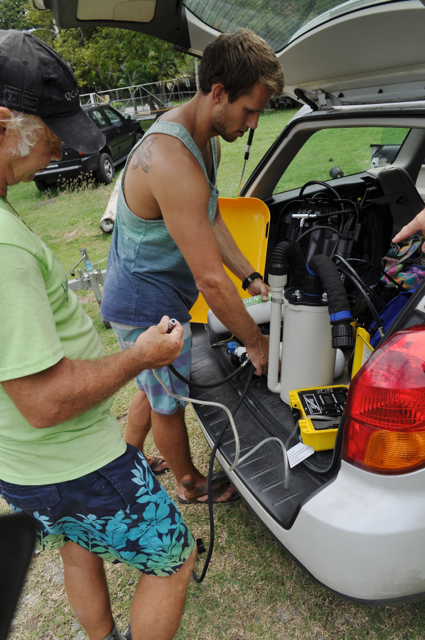
Now imagine doing that without ever needing to surface for air.
Seems near impossible, right?
Well, it’s not anymore. Not if the diver is ready to learn what St. Croix’s Norm Gustafson called “the new wave of the dive world.”
It’s rebreather diving, and to join that world a diver will need to trade in the traditional scuba “open circuit” tank and learn to use a rebreather unit, something now possible on St. Croix through Gustafson’s CQuest Underwater Services Company.
Rebreathers absorb the carbon dioxide of an expelled breath and allow the diver to rebreathe the unused oxygen. Additional oxygen is then added to replenish what’s been exhausted by the diver. In an open circuit system, the exhaled gas is released as bubbles.
As far as he knows, Gustafson said, he is one of the few in the entire Caribbean offering certified open water divers the chance to take the Professional Association of Diving Instructors – PADI – introductory rebreather course, in addition to the full rebreather certification.
The rebreather allows dives as long as three hours, compared to about 45 minutes for a traditional scuba tank of compressed air. Gustafson said more and more divers will use the rebreather technology, which is why he became not only a traditional PADI open circuit scuba instructor, but also PADI certified for using and instructing those who want to use rebreathers.
“They’re on the front edge of the demand curve and they’re starting to reach popularity at this point,” Gustafson said of rebreathers.
Rebreathers have been in existence since the 1860s, but in the past they were used almost exclusively by technical and professional commercial divers and military divers.
“Once they become more affordable, just like with any technology, like dive computers, I think they’ll appeal more to the mass market,” Gustafson said.
Besides giving divers a a significantly longer underwater, a rebreather also does away with the bubble trail of the open circuit scuba system. This creates a more natural interaction with wildlife, which are no longer scared away by bubbles but are curious as to what the diver is, according to Gustafson.
“You can absolutely get closer to marine life,” said St. Croix’s Miki Boulin, a rebreather-certified diver and avid underwater photographer. “If anything, I’ve had to get used to the fact that a lot of stuff comes up to me and checks me out, and can almost get too close to me because they get right in my face and camera with no bubbles, saying, ‘What are you and what are you doing down here? ”
Boulin attributed this to the near noiseless environment created by a rebreather.
“I can be much quieter and stiller the way the buoyancy works,” she said. “You don’t realize how loud open circuit is until you don’t have it.”
She added, “The whole being-underwater experience is very different with a rebreather. It’s almost like what I’d envision as an outer space kind of thing. You’re just out there floating, and it’s really quiet. It’s really cool.”
Gustafson’s close friends and dive buddies, Stephen and Deanna Cunningham, run a similar concierge-type of diving business on St. Croix called Bubble Makers. They’ve both been certified in rebreathers and are getting involved with the technology in collaboration with Gustafson.
Stephen Cunningham said he hopes St. Croix can become an ideal rebreather certification destination in the scuba world, something to rival the Cayman Islands in the Caribbean region.
“They’re the only ones that have specific things set up for rebreather diving,” he said. “We’re going to compete with them. We believe we have the optimum place to learn.”
Cunningham said the learning environment includes St. Croix’s North Shore wall, where dives to 300 feet are possible, and also Frederiksted’s renowned pier.
He also said a big selling point of rebreather diving might surprise some people.
“Once you’ve learned how to do this, it’s a safer way to dive, a less chance to get bent (decompression sickness) for sure,” he said.
Gustafson said another huge advantage to using rebreathers is how a diver will feel after diving.
“When you’re through you don’t feel all worn out because it’s like diving a Nitrox blend (meaning a diver uses oxygen enriched air), except it’s Nitrox on steroids because the rebreather is always giving you the optimal gas you should be breathing,” he said.
The mixture of air being used, unlike an open circuit scuba system, also could allow a diver to go very deep without fearing the effects of nitrogen narcosis.
Gustafson said he’s been “tech” diving near Salt River’s Three Anchor Chute at a depth of 300 feet, where the party he was with from the Silent Diving Institute found a cave that actually circled back up and exited on the reef at a depth of 260 feet.
“Depth doesn’t affect your usage of air and that’s a big difference with rebreathers, because as with open circuit, when you go deeper, you use your air quicker,” he said.
Asked to describe what it’s like to be that deep, Gustafson said with a laugh, “It was different. It was cool.”
Those who want to reach Gustafson’s CQuest to discuss rebreather diving opportunities on St. Croix can call him at 1-340-513-3435 or send him e-mail at info@cqueststx.com. Bubble Makers can be reached at 1-340-719-7201 or by sending e-mail to info@bubblesvi.com.





